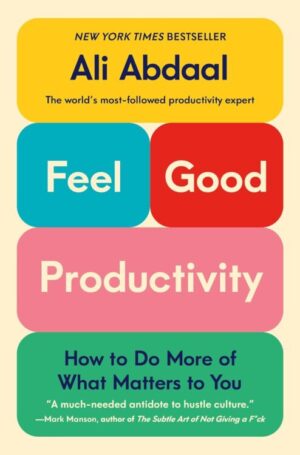Abdaal, Ali. Feel-Good Productivity: How to Do More of What Matters to You. New York: Celadon Books, 2023.
One of my favorite quotes: Success doesn’t lead to feeling good. Feeling good leads to success.
One of the most highlighted passages from Kindle readers: Positive emotions are the fuel that drives the engine of human flourishing.
From the book description:
The secret to productivity isn’t discipline. It’s joy.
We think that productivity is all about hard work. That the road to success is lined with endless frustration and toil. But what if there’s another way?
Dr Ali Abdaal – the world’s most-followed productivity expert – has uncovered an easier and happier path to success. Drawing on decades of psychological research, he has found that the secret to productivity and success isn’t grind – it’s feeling good. If you can make your work feel good, then productivity takes care of itself.
Customers say: Customers find the book offers solid productivity advice and is relatable. They appreciate the author’s writing style that breaks down complex concepts into digestible pieces. Readers describe the content as enjoyable and motivating, injecting them with motivation and joy. The book provides actionable suggestions and studies that can make a huge impact. Customers appreciate the author’s thoughtful, refreshing, and practical approach to engaging. They love the author’s personable tone and warmth that shines through the pages. Overall, customers find this book worth reading if you’re looking to reinforce or improve your productivity.
AI-generated from the text of customer reviews on Amazon
I say: I thoroughly enjoyed this book. I took so many notes while I was reading that my app told me I was copying too much — violating copyright, I guess, because I wanted to keep ALL the ideas!
It’s got lots of great information in it, but it’s also entertainingly written and very readable. The author, Ali Abdaal, is a medical doctor from the UK, but he’s also a YouTuber, and his writing style is friendly and approachable. In a nutshell, he believes that positive emotions drive accomplishment, and that finding joy in your work is the secret to getting more done. He’s got plenty of research backing up his ideas, including references to Barbara Fredrickson’s broaden-and-build theory, and some science on the feel-good DOSE neurotransmitters (Dopamine, Oxytocin, Serotonin, Endorphins) but then he goes in his own direction, with a productivity system built around using energizers & sustainers while avoiding blockers. (The energizers are play, power, and people; the sustainers are conserve, recharge, and align. The blockers are uncertainty, fear, and inertia.)
He offers specific techniques & actionable advice. Here’s an example from his section on energizers:
Seriousness is overrated. If you want to achieve more without ruining your life, the first step is to approach your work with a sense of play. There are three ways you can incorporate the spirit of play into your life. First, approach things with a sense of adventure. When you step into the right ‘play personality’, every day abounds with opportunities to see life as a game, filled with surprises and side quests. Second, find the fun. Remember Mary Poppins: there’s an element of fun in every task, even if it isn’t always obvious. Try asking yourself what this would look like if it were fun, and then build your projects around the answer. Third, lower the stakes. Failures are only failures when you think they are – and not every problem need be approached with such a straight face. So what would it mean to approach your work with less seriousness and more sincerity?
One of my favorite parts of this book was his takedown of SMART goals. Setting SMART (Specific, Measurable, Attainable, Relevant, Time-Measured) goals sounds so good in theory, and is such widely espoused advice that surely it must work, right? Alas, I can’t think of a single time in my life when a so-called SMART goal actually led me to lasting change. It turns out that although “specific, challenging goals can increase performance for certain types of people and tasks, they can also have unintended negative consequences.” Basically, focusing on the goal might kill your intrinsic motivation to do the thing, whatever the thing might be. And a more successful way to get the thing done — again, whatever the thing might be — is probably to focus on enjoying the process of doing the thing! For example, instead of setting the goal of exercising for 30 minutes, three times a week, you look for an exercise you enjoy doing and prioritize it because you enjoy it.
Overall, I highly recommend Feel-Good Productivity: How to Do More of What Matters to You. Absolutely worth reading, especially if you feel like feeling good!

